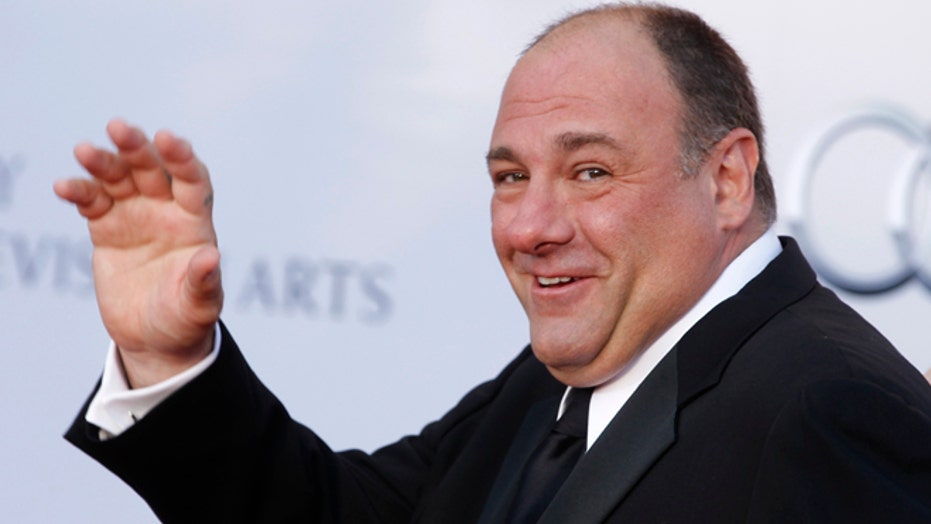A bag of uncooked ziti in the driveway, a "reserved" sign at the ice cream parlor booth where the series abruptly ended, and a framed photo at a strip club were among the tributes paid to James Gandolfini in the northern New Jersey communities where his TV character Tony Soprano lived, loved and whacked people.
The star of the HBO series about a mob boss with anxiety issues and a midlife crisis died Wednesday night in Italy of an apparent heart attack.
In neighborhoods where "The Sopranos" was shot, Gandolfini was recalled Thursday with mixed emotions: a global star who made their communities famous, but sometimes at the expense of their reputations.
Vito Mazza, who was busily preparing for an Italian-American festival in Elizabeth this weekend, said the actor had local credibility.
"He was as Jersey as it gets, through and through," he said.
The "Sopranos" star was born and raised in New Jersey and attended Rutgers University. His character has become an indelible part of the state's global image, as much a part of New Jersey culture as tolled highways, smokestacks and crooked politicians.
Pete Canu, a limousine fleet owner who was sipping coffee in an Elizabeth butcher shop Thursday morning, said Tony Soprano was very realistic.
"He had frailties and failings; he was human, aside from all that gangster crap," Canu said. "A lot of people were offended by it. They say it makes it look like all Italian-Americans are mobsters, but people know we're not. We're just hardworking people who get up every day and do our jobs and provide for our families. It was just a TV show."
But the butcher shop's owner, John Sacco, said "The Sopranos" spread negative stereotypes about Italian-Americans far and wide.
He said when he went to a dentist in Florida and when he revealed he was from New Jersey, someone in the office said, "Oh, the place with all the mobsters!"
"It didn't show us in a real great light," he said.
At Satin Dolls, the real-life Lodi strip club that served as the fictional Bada Bing club in the show, employees put a framed photo of Gandolfini where he frequently sat, calling it "the boss's seat."
"It's like we lost a member of the family," spokesman Bill Pepe said. "Everybody is shocked."
Paul Pereira, of Lodi, stopped to put flowers on a sign in front of the club. He said the show gave a more nuanced picture of people involved in or somehow connected to the mob.
"It showed that these are real people, family people," Pereira said. "You notice that every episode ended with him with his family."
Thursday afternoon, a workman outside the club climbed a ladder and changed the club's marquee from "Bartenders Wanted" to "Thank You, Jimmy; Farewell Boss."
At Green Hill, the West Orange nursing home where scenes involving Tony's ailing mother were shot, executive director Toni Lynn Davis said the residents loved the show. Several even got hired as extras, and the show's payments helped buy a giant flat-screen TV on which they watched the show each week.
"They said it was their weekly vocabulary lesson," Davis said. "They learned all those new swear words."
She said the show has become part of the fabric of New Jersey.
"There are definitely parts of New Jersey that are very close to what was depicted," she said. "You can't go anywhere in New Jersey and not hear that the Sopranos was shot there. They went all over."
The house where Tony Soprano lived is in North Caldwell, and fans were stopping by to show their respects to Gandolfini. Michael Primamore, who lives nearby and whose family runs an auto repair business, left a bag of dried ziti next to the candles that sprouted in the driveway.
He said the show accurately reflected the experiences of his and other Italian-American families who settled in Newark before moving to the suburbs.
"The show was full of so many northern New Jersey Italian expressions, if you weren't raised in that world, you wouldn't get some parts of it," he said. "The show reached me on a personal level in so many ways."
Several North Caldwell residents recalled seeing and meeting cast members.
"They were great people, very personable," said Chris Masi, who said he met Gandolfini. "They would come up and give you a hug. They put us on the map. It meant a lot."
Fans also gathered at Holsten's, the Bloomfield ice cream parlor where the show's famous cut-to-black last scene was shot.
"I'm sad he died," said Fred O'Neil of Montclair, who, like Gandolfini, is 51. "I can't believe it. It makes me think of my own mortality."
Primamore said his reaction to Gandolfini's death was a lot like what Tony Soprano's would have been: "It's a tragedy. What are you gonna do?"







